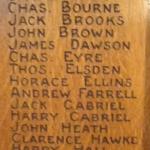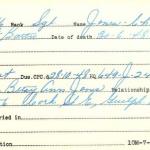BX April 12, 1917
Favored Returned Soldier For Job – Trades and Labor Council Discussed Appointment of Jailor
The meeting of the Trades and Labor Council last evening was well attended. President Noble called attention to the vacancy for a jailor. He said there was competition between city and county aspirants for the appointment, it being understood that the eventual selection would be between one from each, whose names he mentioned. He thought a soldier should be appointed, and he had raised the question at a recent patriotic meeting. The idea was, however discouraged.
Hon. Delegate Keen took the view that the legal and moral obligation resting upon the trustees or agents for private employers rested equally upon the trustees or agents for public employers that is to say to select the best possible public servant for the position vacant who could be procured for the price the public was prepared to pay for the service. In ordinary business life selection based upon motives of advantage to the people in control was regarded as a fraud upon the actual employer and under certain circumstances, such malfeasance would involve imprisonment. Fraud upon the public interests was, however, so common in the political life of Canada that wrong had all the appearance of right. The excuse of the leading politicians of both parties was that the circumstances were beyond their control. Many of them hated this fraudulent method of selection, politically called “patronage system,” and would like to escape from it. This war provided them with an opportunity. Many men were returning who had risked their lives, primarily for the maintenance of our political rights, but incidentally for the protection of the property of the ruling and dominant class in society. They were men, too, who usually had no property of their own to protect. Most selections could be made without injury to the public service from that class, and it would enable the political parties eventually to establish an honest, impartial and efficient system of civil service, based, as in private life, upon merit instead of upon unworthy influences. He therefore moved:
“Whereas there is a vacancy as governor of the county jail of Brantford to be filled;
“And whereas, it is not the practice to select such officials on a competitive basis with due regard to efficiency, and it is not an appointment demanding special skill;
“And whereas, a considerable number of the citizens of the city and county are returning after risking their lives at the front in the interests of the Empire;
“and whereas, in the interests of recruiting the government should make it manifest that such appointments not requiring special skill shall in every case, be awarded by men who have served their country in the war, and to the exclusion of men who have not suffered similar risks and discomforts;
“Be it therefore resolved that this council strongly urge the proper authorities in the filling of the said vacancy to select some suitable person having the above-mentioned qualifications.”
Delegate Parmenter, in seconding, said that it was probable there were some men who had risked their lives for their country who could on returning be physically incapable of following their former employment, but who would be mentally capable of discharging with satisfaction the duties of jailer. Such a man should be appointed.
Delegate Brown thought, if there were any governmental plums to be handed out, soldiers should have them. Every soldier who was appointed was one competitor the less on the labor market. Efforts would be made by some employers when the soldiers came back by the hundreds of thousands to play them off against people already in employment to reduce wages.
Delegate Morien was of opinion the T. and L. Council should show the soldiers that while they had been away the council had sought to look after their interests. The soldiers should, however, themselves see that the governments kept their promises.
Delegate Kyte took a similar view and the resolution, which was further, supported by Delegates Walkers and Handsord, was carried unanimously.
BX April 14, 1917
Returned Veteran For Governorship – Women’s Patriotic League Urges Government to Fill Position Thus
The feeling that the vacant position of governor of the Brant County jail, made vacant by the death of the late J.Y. Brown, should be given to a returned soldier, of whom there are now many in the city who can qualify, is growing. The Trades and Labor Council on Wednesday evening took this stand. The Women’s Patriotic League, which is composed of many women’s organizations in the city affiliated into a common body, has taken a similar stand, as is shown by the following letter received by The Expositor this morning:
To the Editor of the Expositor
At an executive committee meeting of the Women’s Patriotic League, held on April 13, the following resolution was passed:
“Resolved that the Women’s Patriotic League of Brantford to petition the Ontario Government to appoint a returned soldier from Brant County to the position of governor of the Brant County jail, providing a soldier is capable of filling the position is available.
“Be it also resolved that the women of the affiliated societies of the Women’s Patriotic League do support by their vote and influence the appointment of returned soldiers to vacant positions which they may be capable of filling.”
The above resolution has the support and approval of the men’s committee of the Patriotic Fund.
Signed on behalf of the Women’s Patriotic League.
Charlotte E. Livingston, Pres. W.P.L.
Nellie J. Lain, Secy. W.P.L.
BX April 16, 1917
Veterans Appeal to Government – Want Post of Governor of County Jail Filled by Returned Man
The Brantford Branch of the Great War Veterans’ Association of Canada at a meeting in the Y.M.C.A., on Saturday evening decided to petition the provincial government with a view of having the vacant position of governor of the jail given to a returned soldier. The resolution, which was passed, follows:
“Resolved that this association, Great War Veterans of Canada, petition the provincial government to appoint a returned soldier from Brant County to the post of governor of the Brant County jail, and that copies of this resolution be sent to the sheriff, warden of the county, reeve of Brantford Township, and the local members of parliament, the mayor and the local newspapers.”
BX May 18, 1917
Veteran is New Jail Governor – Sergt. Charles Jones, Hero of “Mad Fourth,” Receives Appointment
Sergeant Charles Jones of Brantford, a veteran of the “Mad Fourth” Battalion, has been appointed Governor of the Brant County Jail, to succeed the late J.Y. Brown, Sergt. Jones is at present working at the Steel Company of Canada and is a married man, residing at 12 Walnut Street. He enlisted as a private with the First Contingent and was promoted to be a sergeant in the field. He was at the front about a year and was invalided home in September, 1915, minus his left eye.
After the death of the late Governor J.Y. Brown, there were a number of applications for the position and all appearances pointed toward a political appointment. However, the Trades and Labor Council, Equal Franchise Club and the Great War Veterans’ Associations passed strong resolutions with a view to having a returned soldier get the post. The matter was in abeyance until the announcement last night of Hon. W.D. McPherson, provincial secretary, that Sergt. Jones had been appointed.
Although Sergt. Jones was a veteran of the Boer War with the Royal Welsh Fusiliers, when war was declared between England and Germany and the call came for men he was one of the first to respond. After a preliminary training at Valcartier he went overseas with the First Contingent. He went across from Salisbury Plains with the 4th Battalion, and then got a severe taste of the world’s greatest war. He went through the stiff engagements at Langemarck, Festubert and elsewhere. At Langemarck, he went through a hard battle which lasted five days.
It was at Festubert that he was wounded. He sustained shrapnel wounds in the left eye, arm and hand while the Canadians were holding a barricade which had been won from the Germans. He was sent back to the hospital and an operation performed, but he lost the sight of this eye. He was reported wounded here on June 16, and returned to his home here on September 27, 1915. Before the outbreak of war he was employed as a carpenter by the Massey-Harris Company.
Premier Hearst over-ruled the recommendation of the local Conservative executive, which had recommended that S.P. Pitcher, a life-long Conservative and a strong party worker, receive the appointment.


